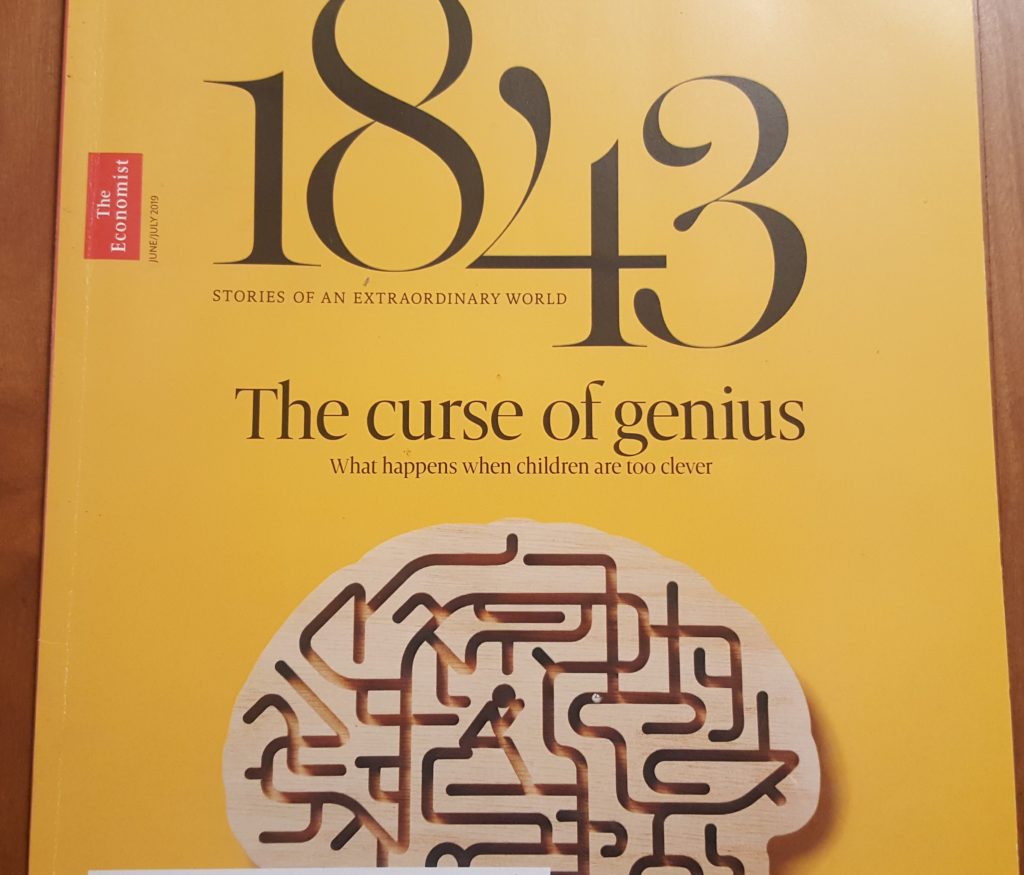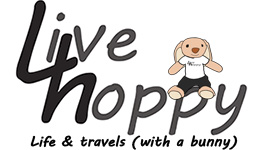
We see exceptional intelligence as a blessing. So why, asks Maggie Fergusson, are so many brilliant children miserable misfits?
1843
I recently read a piece in the magazine 1843 called The curse of genius that really resonated with me. (1843 is the sister magazine of The Economist.)
The article left me thinking. And it made me want to share things that I don’t normally share.
Some things are hard to talk about. There are a lot of pretty deep topics that I’ll open up about. Maybe not on my blog for the whole world to read, but to the people close to me.
This is a topic that I rarely broach even with those that I’m closest to.
Being smart. Like really smart.
I’m talking here like traditional test-taking smart. The ability to remember and synthesize information. Math smart. Being able to figure things out.
I’m not on the level of some of the kids mentioned in the article. I might not claim the title of genius, but maybe of borderline genius. If you put me in a room with a hundred random people, I’ll probably be the smartest one there. In a room of a hundred thousand people… probably not.
That’s not an easy thing to write. It’s not the sort of thing that you make friends saying. It doesn’t lead to positive responses. Even typing that out, I imagine I’m not making friends with you, my imaginary reader.
When I was in the eighth grade, I went to a combined middle school and high school. I took pre-calc with the high school seniors and felt bored to tears.
I didn’t even have the opportunity to take calculus for another few years. I can still remember my high school principle telling me she didn’t think I could handle a college math class.
Looking back on it, I realize she could not have handled it and she couldn’t imagine that I could. At the time, it was just frustrating. ( When I did go on to take calculus later, it was so easy for me.)
This lady told me I needed four years of math credit to graduate. She also told me I couldn’t take any of the classes the school offered because they were below my level.
So basically I was screwed and more than anything I just wanted to finish with high school and move on to something more challenging.
I started college when I was 15. It was officially my third and last year of high school, but by this time I had transferred to a different school.
My new guidance counselor was someone I only met briefly, but was like an angel in my life. She was forgiving with my transcript. She entered in a P for Pass for Algebra II even though I’d never taken it. (Yep, I’d taken pre-calc without the pre-reqs.)
This lady made everything work out so I only had to take one class at the high school and could spend the rest of the time at the local community college. She got out of the way and let me move on with my education.
A few months after I turned 18, I had my associate’s degree in General Science. I transferred and had my bachelor’s in math before I turned 21.
Through all of this, I never found the intellectual challenge I craved. By the end, I did feel a bit burned out by school, in part because I never did find that challenge.
If it had been hard or stimulating, I would have dug in and really engaged. I love challenges. Instead it just felt easy and monotonous.
Looking back on it, I think I could have found a field of study that I found more satisfying.
The thing about math is that it’s sort of thought of as a right or wrong sort of field. It’s all about who can figure out a problem or figure it out faster. My quick wits were not appreciated by my (mostly) male professors.
On the other hand, I minored in biology and hit it off way better with the bio profs. Biology is a field where there is just so much that isn’t known. It’s a messy field. If I pointed out something to a bio prof that they didn’t know, they were excited rather than embarrassed.
When I was in elementary school and everything came easily, everybody told me to wait until middle school. Then they said to wait until high school and then for college.
When I was at the community college, they told me to wait until I was at a 4-year school. By the time I had finished my bachelor’s degree, I had still found most of it boring and easy.
Which is not to say that some of it wasn’t fun stuff to learn. I particularly remember physics and biology as being topics that just had cool stuff. Even if they were easy for me to understand, they were interesting.
And pottery. I took a lot of pottery classes in college.
So once I had my bachelor’s I had no interest in pursuing further education.
This makes me a bit of an under-achiever by my family’s standards. I have an aunt that jokes that she’s the under-achiever in the family because she ‘only’ got her master’s degree and her three siblings have doctorates.
(I still leave open the idea in my mind that maybe someday I’ll go get a PhD. It would have to be the right topic and I’d have to feel that I really needed the resources of a university for it. There are so many things I could just learn on my own and save the money. Of course being self-taught lacks the prestige of a fancy diploma.)
I want to go back a moment and mention something about my earlier years in school. School was a struggle for me. It was AWFUL.
I didn’t find learning new things to be hard. I found the snail’s pace at which classes moved to be excruciating. There is no flexibility in most of our schools for kids that learn faster or slower.
In addition, nobody likes a smart kid. Of course, it didn’t help that I was shy and awkward. (I also switched schools every year due to my parent’s custody agreement.)
I didn’t know that people would like me better if I hid how smart I was. Certainly I was, at times, rather insensitive about how I presented my intelligence which did not help. I yearned for the approval of my peers and teachers. Since all I had going for me was brains, I tried to use that to gain said approval.
I didn’t have the right sort of brains. Like many ‘smart’ people, I didn’t have any social intelligence. I didn’t know how to make friends.
While I’ve made huge strides along those lines, it’s something I can still struggle with. Social interactions can be really hard for me.
These days, I don’t like to let on to anybody how smart I am. I let other people be wrong and don’t correct them. I keep my mouth shut. It helps a lot not being in an environment where it comes up. The whole basis for school makes it a little harder to hide intelligence without an intentionally stealthy approach.
A lot of people have this idea that they ‘wish they were smart’. I have had many people express envy for my abilities. Unfortunately, envy is not a basis for friendship. There is no explaining to these people the challenges.
Being smart does not lead to being happy or wealthy or well-liked. It may give a slight advantage on the wealthy goal, but emotional/social intelligence actually gives a much higher advantage there. As far as being happy or well-liked unusual intelligence is probably a disadvantage. (Of course, I wouldn’t actually trade it in.)
One of the things I loved about the 1843 article was that it brought up these disadvantages. It talked about how so many parents want their kids to be smart, but the parents of these genius kids just wish they were normal.
I want to say, “If you envy those people that are smarter than you, STOP IT!” My saying that probably won’t change anything. It’s really no different than the other traits we envy in people. If you’re not that person, you have no idea what it’s actually like. I also recognize that getting from Point A of knowing that to Point B of squashing out envy is not straightforward.
Also, it should be noted that I spend my time envying people that have other talents or skills or types of intelligence. I sit around wishing I could make friends or had sales skills.
That’s just what we all do. We envy other people because we think if we had what they do, we’d be happy. Meanwhile, the person we’re busy envying is envying somebody else.
I just feel like being smart has it’s own stigma to it. It’s so much more acceptable to show off being pretty or successful or talented. I’d rather share about my short-comings than mention my brains. (Which is actually part of why I’m writing this. I want to reach that person that is 1 in a 100 with a message that they’re not alone.)
On a side note, I don’t find myself admiring people for innate skills. I admire the people that work their asses off for something.
When I was a math tutor in college, I had so much respect for the people taking the most basic math classes, showing up and putting in the work because they had some sort of goal.
This was when I was at the community college and a lot of these people were three times my age, going back to school for whatever reason and taking something like Math 050 which is not even actually college level math.
It was so hard for them. And yet they showed up and worked their asses off.
I still get riled up when I think about my experiences in school. I recently read an article about a country where they look for their smartest kids and have special programs and schools to help them excel. It makes me think, “Why couldn’t I have had that?”
It’s sort of funny because while I do sometimes wish I were different or that I had different skills and strengths, I would not change who I am.
Over time, I’ve grown much more comfortable with me. I think this happens to most of us as we grow older. The differences that made us miserable as teenagers turn into things we maybe even like about ourselves.
Ironically, the single thing I found the hardest to deal with as a brainiac was school. Once I got past that stage of my life, things got a lot easier.
Now I can learn about what I want when I want. (Reading a book on a different topic while sitting in a high school class just doesn’t fly. Come to think of it, some of my college professor’s didn’t look too kindly on that sort of behavior either.) Now I can learn at my own pace.
The revolution of this thing we call the internet has opened up so many options for learning things that it is ridiculous and amazing. The internet DID exist when I was in high school, but it had no where near the information available that it does today.
These days I’m busy mostly with things that don’t even involve my brand of smarts. I haven’t opened a math text book in over a decade.
Brains do not make parenting a two-year old easier. At times, I find the way my brain works to make it harder. I have an incredibly difficult time switching my mind away from a problem I’m contemplating or a project I’m working on to the immediate issues of parenting.
Maybe I shouldn’t be complaining. This may not be a more difficult problem that switching focus from Facebook to one’s child is for some people. (I do find that having a predetermined idea of my priorities make it a lot easier. I do not want my kiddo to feel like I am too busy for him.)
I have also found that I get a ton of satisfaction working in areas I’m not innately talented. Challenges engage me.
I enjoy things like wood working and riding my bike which go against my natural skills. Power tools and riding over rocks spike my anxiety big time. Every time I have a small success in these types of pursuits, I am thrilled.
So these days you won’t find me in a classroom. You’ll find me and my bike out on some dusty, rocky, steep trail that is above my skill level and me enjoying every second of it in a slightly sadistic sort of way.
Either that or I’ll be trying to make my son laugh by rubbing the top of my head on his belly which he has found inexplicably funny since he was like four months old.
Or maybe you’ll find me reading him books and talking to him with over-sized words so he’ll grow up to be smart.
If you didn’t read the article I linked at the top that was the inspiration for this post, here’s another link to it. I thought it was excellent and if you read all the way to the bottom of this post, chances are you’ll like it too.
Note: I actually wrote this post about a year ago… and then didn’t publish it. It felt too vulnerable. It almost still does. But reading it with fresh eyes, I like it too.
Also, these days, you just might find me in a classroom. I’ve recently taken on a job for a Data Science Bootcamp, which I love. Being smart by itself is not really fulfilling. Being able to use it in a way that helps others is awesome. I love teaching and helping others to learn things.





5 Responses
I am one of the people you were targeting by writing this. I had just read the 1843 article right before this which makes it even more impactful. I felt like I was reading something I wrote myself. I don’t think I have ever commented on something like this in my entire life but I felt super compelled to write this and thank you. You achieved your goal with me, in a particularly tough time for me I really needed to feel like I wasn’t completely alone for a change. “That’s not an easy thing to write. It’s not the sort of thing that you make friends saying. It doesn’t lead to positive responses. Even typing that out, I imagine I’m not making friends with you, my imaginary reader.” This part hit me so hard that I couldn’t even provide my email address even though it clearly promises that it won’t be published. I simply can’t take the chance that someone I know would find out that I wrote this, because there is no one in my life that wouldn’t just roll their eyes. The saddest part is that I wouldn’t even be able to blame them.
Thank you for your comment – it is nice to know that my writing had an impact. Hugs to you. This can definitely be an isolating thing in a way a lot of people don’t understand. Emails definitely aren’t published – I think they’re just used to notify you if somebody replies to a comment you left and possibly by the spam detection ‘magic’ because the amount of comment spam blogs get is truly insane.
*Hugs* and sympathy. I feel like I could write a novel in response, but I would probably start crying and not stop, which I don’t want to do today. The TLDR version, though, is that I know exactly how you feel, right down to how dangerous it must feel to share this. Being really smart has its advantages, but the drawbacks are far greater than most people realize. And being a really smart girl poses its own set of challenges that only a few people can appreciate. I survived by existing in the world of books and eventually I stumbled into a university with an ample supply of overly bright misfits, but — well, this is such an area of vulnerability for me that I’m tempted to just delete this comment and go cry for a while. (My devastating argument with my son literally included him saying, “It’s just that you’re really smart and so…” ) But no novels! Just appreciation, understanding, and gratitude for sharing.
Thank you for this comment. Sending lots of virtual hugs your way!
I’ve had this issue for as long as I can remember also carrying the stigmatized conditionele known as BPD which only gives me an insane level of emotional intelligence. When I was younger it was hard to use my intellect due to the extreme emotional impact external stimuli has on my ability to wield conscious thought appropriately.